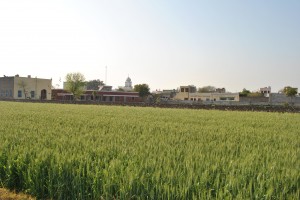Agriculture33
-

Tensiometers in Punjab
So far, tensiometers have been tested in four central districts of Punjab, initially with more than 500 farmers the first year, and then peaking with an additional 4,500 farmers in 2011 before testing was scaled back. Data showed, on average, a 30 percent reduction in the water used in the test plots when compared with…
-

Urban Agriculture and the Damage From Storm Sandy
Urban agriculture faces unique growing challenges due to the peculiarities of farming in a densely built environment. Storm Sandy highlighted additional challenges New York City farmers and gardeners must face as a result of increasingly extreme weather.
-

Achieving Sustainable Water, Energy and Agriculture in Gujarat, India
Watch a video about the Columbia Water Center’s project to address a looming water crisis in north Gujarat, India.
-

Extraordinary Support for Sustainable Development
Visit the interactive digital Earth Institute 2012 Annual Donor Report to see some of the remarkable projects, initiatives and achievements that have been made possible through the support and advocacy of donors, students, faculty and staff in fiscal year 2012.
-

Making Sense of Climate’s Impact on Food Security
From warmer temperatures to natural disasters such as flooding and drought, changing patterns of climate are having billion-dollar impacts on our food-growing systems. But scientists are struggling to find ways to measure and predict what may happen in the future—and to translate that into policies to help feed a bulging world population.
-

Improving Seeds to Meet Future Challenges
Scientists and agronomists are racing to develop seeds that are higher yielding, more nutritious, and both drought and climate resilient to meet the challenge of feeding the world in the future.
-

Rosario’s Farm: Rising Tides, Shrimp from the Forest
Rosario Costa-Cabral and her brothers harvest hundreds of fruits, oils and wood products from the stream-laced forest of the Amazon River delta. But the climate here is changing: Tides rise higher, and seasonal floods are growing worse.
-

New Understanding of Soil Quality throughout Africa
A new interactive mapping tool lets users visualize a broad range of soil data for the continent of Africa.
-

Poor Ethiopian Farmers Receive ‘Unprecedented’ Insurance Payout
Thanks to a groundbreaking new program that relies on advanced satellite technology, a weather index insurance payout of unprecedented scale will benefit poor African farmers.

By studying thousands of buildings and analyzing their electricity use, Columbia Climate School Dean Alexis Abramson has been able to uncover ways to significantly cut energy consumption and emissions. Watch the Video: “Engineering a Cooler Future Through Smarter Buildings“
